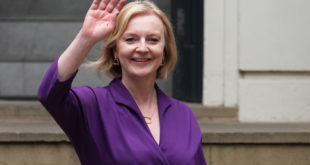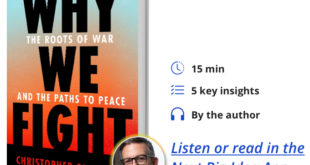Philip Hensher There were some very good novels this year, but they came from surprising directions. It is astonishing that one as original as Kate Barker-Mawjee’s The Coldest Place on Earth (Conrad Press, £9.99) couldn’t find a major publisher. A friend recommended this wonderfully controlled and evocatively written novel about a heart coming to life in the depths of Siberia. I always enjoy Mick Herron’s half-arsed spy thrillers, but Bad Actors (Hodder & Stoughton, £18.99)...
Read More »Vox FuturePerfect50
Chris Blattman is an economist and political scientist at the University of Chicago, but he’s not the type to dwell in an ivory tower working purely on theoretical questions. Instead, he does empirical work that gathers data from the real world — which then influences the real world in turn. His recent research focuses on violence, asking questions like: Why do people fight? How can we reduce the chance that criminal violence or war will spring up or stop it once it has? He’s explored...
Read More »If we elected more women would there be less war? Yes but not for the reasons you think
Liz Truss is the United Kingdom's new prime minister—that brings the number of female leaders in the G20 to two. She enters world politics at a tense moment: Russian President Vladimir Putin's invasion of Ukraine looks unlikely to end anytime soon, and tensions in the Taiwan Strait are greater than ever. The risk of a great power war between the West and Russia or China seems greater than any point in 30 years.Maybe what we need is more women in charge, and fewer macho men. Surely that would...
Read More »Predicting and preventing violent crime before it happens
All of us want to feel safe in our daily lives. Yet when we think about crime, our first response is often a blanket approach: find the bad guys, and punish them. But what if there were another way? This week on the show, researchers Sara Heller and Chris Blattman explore how technology and psychology can be used to radically transform our approach to crime. Additional Resources “Social Networks and the Risk of Gunshot Injury,” by Andrew Papachristos, Anthony Braga, David Hureau in the...
Read More »Financial Times: A best summer book for 2022
By the way, this is not just a rule of thumb for the rare violent and threatening tweets, but rather for the far greater number of tweets where a member of your own group is enraging you about the actions of an adversary. This could be events in Ukraine, identity politics, etc
Read More »Book Club with Jeffrey Sachs
Join Professor Jeffrey Sachs and Professor Christopher Blattman, to explore the dynamics of war and peace as they discuss Blattman’s, Why We Fight: The Roots of War and the Paths to Peace. In his newest book, Blattman argues that violence is not the norm; that there are five reasons why wars break out; and how peacemakers can draw on these reasons to prevent and stop wars. Together, they explore the dynamics of war and peace: how communities resolve conflicts, and why such...
Read More »Book Bite from The Next Big Idea Club
Chris Blattman is a professor in the Pearson Institute for the Study and Resolution of Global Conflicts at the University of Chicago. His 20 years of researching war has taken him from a war in northern Uganda, to violent mining camps and urban slums in postwar Liberia, to meet leaders of drug cartels in Medellín, and even work with street gangs in Chicago. His new book argues that fighting is hard, and finding peace is easier than you think. Below, Chris...
Read More »Interview with Christianity Today on Why We Fight
Here on the Better Samaritan we’re learning how to “do good better.” Using Jesus’ story as a guiding metaphor, this involves getting better at (like the Good Samaritan did) helping the person left by the side of the Jericho road who was robbed and beaten up. It also involves learning how to make the metaphorical road safer. Why We Fight: The Roots of War and the Paths to Peace, by Chris Blattman, helped me to better understand why the road is dangerous at times–and also how we can make it...
Read More »A study gave cash and therapy to men at risk of criminal behavior. 10 years later, the results are in.
What if someone told you that you could dramatically reduce the crime rate without resorting to coercive policing or incarceration? In fact, what if they said you could avert a serious crime — a robbery, say, or maybe even a murder — just by shelling out $1.50? That’s such an incredibly good deal that it sounds too good to be true. But it’s been borne out by the research of Chris Blattman, Margaret Sheridan, Julian Jamison, and Sebastian Chaskel. Their new study provides experimental...
Read More »When will the costs of war force peace in Ukraine?
It’s easy to see the war in Ukraine as a sign of an inescapably violent world. But if the future looks bleak, perhaps that’s because we focus on the conflicts that happen and overlook the gravitational pull of peace.An example came on March 9, two weeks into the Russian invasion. Shortly after sundown, India accidentally launched a cruise missile at Pakistan. Predictably, calm ensued. Both sides strove to avoid escalation — as they have for decades.Focusing on the times peace fails is a kind...
Read More » Heterodox
Heterodox



